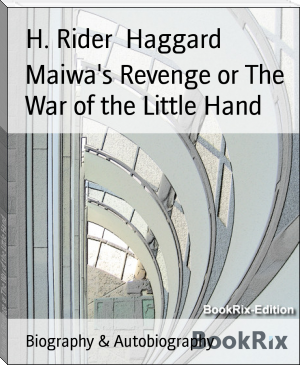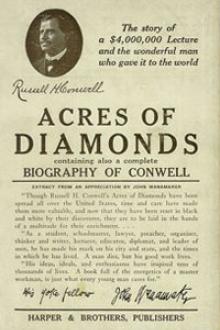Maiwa's Revenge or The War of the Little Hand, H. Rider Haggard [book club reads TXT] 📗

- Author: H. Rider Haggard
Book online «Maiwa's Revenge or The War of the Little Hand, H. Rider Haggard [book club reads TXT] 📗». Author H. Rider Haggard
"Before we went I took a formal farewell of Maiwa, whom we left with a bodyguard of three hundred men to assist her in settling the country. She gave me her hand to kiss in a queenly sort of way, and then said,
"'Macumazahn, you are a brave man, and have been a friend to me in my need. If ever you want help or shelter, remember that Maiwa has a good memory for friend and foe. All I have is yours.
"And so I thanked her and went. She was certainly a very remarkable woman. A year or two ago I heard that her father Nala was dead, and that she had succeeded to the chieftainship of both tribes, which she ruled with great justice and firmness.
"I can assure you that we ascended the pass leading to Wambe's town with feelings very different from those with which we had descended it a few days before. But if I was grateful for the issue of events, you can easily imagine what poor Every's feelings were. When we got to the top of the pass, before the whole impi he actually flopped down upon his knees and thanked Heaven for his escape, the tears running down his face. But then, as I have said, his nerves were shaken--though now that his beard was trimmed and he had some sort of clothes on his back, and hope in his heart, he looked a very different man from the poor wretch whom we had rescued from death by torture.
"Well, we separated from Nala at the little stairway or pass over the mountain--Every and I and the ivory going down the river which I had come up a few weeks before, and the chief returning to his own kraal on the further side of the mountain. He gave us an escort of a hundred and fifty men, however, with instructions to accompany us for six days' journey, and to keep the Matuku bearers in order and then return. I knew that in six days we should be able to reach a district where porters were plentiful, and whence we could easily get the ivory conveyed to Delagoa Bay."
"And did you land it up safe?" I asked.
"Well no," said Quatermain, "we lost about a third of it in crossing a river. A flood came down suddenly just as the men were crossing and many of them had to throw down their tusks to save their lives. We had no means of dragging it up, and so we were obliged to leave it, which was very sad. However, we sold what remained for nearly seven thousand pounds, so we did not do so badly. I don't mean that I got seven thousand pounds out of it, because, you see, I insisted upon Every taking a half share. Poor fellow, he had earned it, if ever a man did. He set up a store in the old colony on the proceeds and did uncommonly well."
"And what did you do with the lion trap?" asked Sir Henry.
"Oh, I brought that away with me also, and when I reached Durban I put it in my house. But really I could not bear to sit opposite to it at nights as I smoked. Visions of that poor woman and the hand of her dead child would rise up in my mind, and also of all the horrors of which it had been the instrument. I began to dream at last that it held me by the leg. This was too much for my nerves, so I just packed it up and shipped it to its maker in England, whose name was stamped upon the steel, sending him a letter at the same time to tell him to what purpose the infernal machine had been put. I believe that he gave it to some museum or other."
"And what became of the tusks of the three bulls which you shot! You must have left them at Nala's kraal, I suppose."
The old gentleman's face fell at this question.
"Ah," he said, "that is a very sad story. Nala promised to send them with my goods to my agent at Delagoa, and so he did. But the men who brought them were unarmed, and, as it happened, they fell in with a slave caravan under the command of a half-bred Portuguese, who seized the tusks, and what is worse, swore that he had shot them. I paid him out afterwards, however," he added with a smile of satisfaction, "but it did not give me back my tusks, which no doubt have been turned into hair brushes long ago;" and he sighed.
"Well," said Good, "that is a capital yarn of yours, Quatermain, but----"
"But what?" he asked sharply, foreseeing a draw.
"But I don't think that it was so good as mine about the ibex--it hasn't the same /finish/."
Mr. Quatermain made no reply. Good was beneath it.
"Do you know, gentlemen," he said, "it is half-past two in the morning, and if we are going to shoot the big wood to-morrow we ought to leave here at nine-thirty sharp."
"Oh, if you shoot for a hundred years you will never beat the record of those three woodcocks," I said.
"Or of those three elephants," added Sir Henry.
And then we all went to bed, and I dreamed that I had married Maiwa, and was much afraid of that attractive but determined lady.
ImprintPublication Date: 11-12-2014
All Rights Reserved





Comments (0)